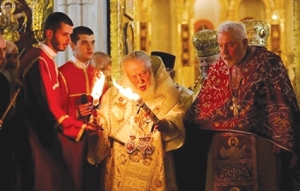Nothing We Can’t Escape: The Easter Epistle
OPED
Good things are well appreciated in this culture and bad ones are taken with fear and apprehension. We are emotionally motivated and impulsively operating folks, and this is either good or bad – I don’t really know.
What I know for sure is that we are oversensitive in our reactions to somebody else’s words and behavior and blunder-prone in judgments, especially in quick ones. We are Christians –Orthodox – who diligently go to church and listen to sermons and epistles as they occur, but I am not sure how well we are learning from those inspirational precepts.
The other day, I watched and listened – on the television– to the Patriarch’s Easter Epistle and I came under the impression that the ideas sounded in it were very much part of our contemporary secular life and absolutely fit into the model of rational human behavior which we lack here in Georgia. It occurred to me that standing in church for hours faithfully holding long burning candles on Easter or Christmas night is not enough to be a good Christian.
Unless the faith – no matter how strong it might be – is supported by wits to understand and willingness to listen to sermons and epistles, the efforts of a spiritual leader are doomed to be in vain and will never trickle down to an acceptable human behavior in favor of society in general and a churchgoer in particular.
One of the Patriarch’s valuable messages was that sin has not only a pernicious but also a destructive influence on us. We need to hear this on an everyday basis, because even if we are aware of the destructive nature our sins, we are still headed for it either consciously or unconsciously because this is a regular and hardly avoidable human proclivity. Who would know better than us how sinful we have been or are presently? And although it is said that the sin confessed is a sin redressed, its effect may not be remedied that easily. Somebody has to be instilling the sin’s consequences in our minds on a regular basis. This is exactly what the Patriarch is doing by emphasizing the destructive character of our sins. It is obvious that not sinning is a far better idea than first sinning and then confessing it, although the act of repentance has its particular manning in our existence.
Another precept which I heard in the Epistle: we have to get closer to God! This should partly mean, as I understood, that we are not capable of getting rid of our sinister disposition, being the slaves of our unbridled passions. We need to learn how to observe our own conduct in general and how to practice analytical thinking, discerning clearly between good and evil. His Holiness said that living righteously means successfully merging in ourselves our physical, mental and spiritual lives.
It is also noted in the Epistle that we should not get used to a blurry and confused way of thinking and must not use vulgar language to express ourselves. How timely and relevant a remark! Our society is unwittingly, if not deliberately, destroying the Georgian language – its strength and flexibility, its richness and loftiness, its inner depth and the potential to serve the nation in every possible respect, and make us feel proud because we are one of those nations of the world who use their own tongue and writing. We hear and read vulgarisms in the street, on the television and radio, in newspapers and magazines, which do us no credit or honor.
The Epistle openly emphasizes the importance of employment and says with no reservation that all will be good with us if people have access to jobs that can support them and their families. One of the points of major concern in the Epistle is the problem with kids living on the streets and who should not be left to the discretion of street rules and lifestyle. My interpretation of this part of the Patriarch’s Easter appeal to His wide parish, comprising the entire nation, is that part of the country’s potential might be in the children who are today left to the mercy of the street but tomorrow might present themselves to our society as honest taxpayers and movers of the nation forward. Including those wayward kids into useful activity is one of the greatest obligations our people have, says the Patriarch. Indeed it is! This must be a purely governmental sphere of obligation and society might only have a correct attitude towards what the State is doing. Men and women in the street could certainly afford alms for those kids, but nobody is sure about the moral side of this kind of charity – would this be a right thing to do or not? Let the dead bury their own dead, as the Bible says, which, to my mind, means that our needs have to be taken care of accordingly, but not neglecting our spiritual calling in the meantime. And the final accord of the Easter Epistle: there is no situation you can’t escape – simple but truly encouraging!
Nugzar B. Ruhadze












